|
~All images below
are clickable - click them to see a larger higher quality
image~
If you’re going to be off grid, or have a real electric
backup plan, you are going to need batteries. Big ones.
Or a lot of little ones.
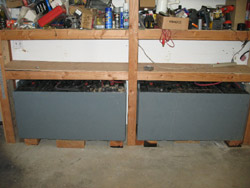
The first choice you will make if you’re going to
use Solar Panels or Wind Power is the voltage you will run
at. Simply spoken, the higher the better. In DC power, 48
Volts is optimum, primarily because 48V Inverters are readily
available, and because wire size gets a lot smaller, cheaper
and easier to use with 48V versus 24V.
This being the case; the next thing you’d think about
is batteries.
There are three different major types of batteries, and
for my uses, the best one is certainly large forklift batteries.
Here are my reasons.
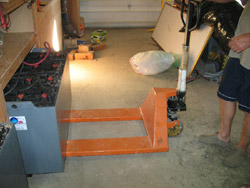
The larger the amperage rating on a battery, the easier
your use of it will be on it. For example, a smaller battery
is going to get emptied quicker & more often than a
larger one will, throughout it’s lifespan. Most all
batteries have a life expectancy that is based on “cycles”
or the amount of times that you take the battery from 100%
(full) to 20% (empty).
If you take a small battery down to it’s lowest voltage/percent
of charge often, it won’t last long. On the other hand,
if you have a larger battery that you don’t exercise
nearly as much, it will last a lonnnng time.
Forklift batteries are built under the premise of having
a lifespan of 1500 to 1800 “cycles”, or broken
down, using them until empty 5 days a week, for 5 years.
That’s taking them from 100% charge (full) to 20% (empty)
every day, for 5 years. That’s a LOT of use, no?
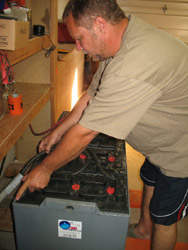
Now, take that same battery, put it in your off grid application,
or just use it for backup when the grid power fails, and
how long will it last?
Longer than you, probably.
Now, let’s talk about maintenance.
That means watering your batteries, and checking gravity.
On watering the batteries, the question becomes quickly,
have ya done it?
If you have, and you don’t have a watering “system”,
you’ll figure out that the only way to do it is to
wear a headlamp, and look down into each cell as you water
it. A 48V Forklift battery has 24 cells, so checking one
is about taking 24 caps off, looking inside, and then pouring
what you think is adequate water into the cells. 24 isn’t
so bad, right? Lotta fun, looking like an old weird Doctor,
peering into little vats of acid…
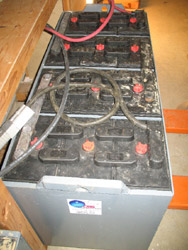
But, what if you had to have a smaller battery, maybe a
bunch of smaller batteries?
You might EASILY have 108 cells to check. Or more.
It’ll drive you nutso…..trust me.
Also, with a forklift battery, if you DO go through a cell,
or have one go bad, you can replace a cell, individually.
You can’t do that on smaller batteries, cell dies,
battery does too.
The good thing about smaller batteries is that they are
easier to move/maneuver.
But that’s all.
The MUCH better way to go at this is to use larger batteries,
the way you use them will be MUCH easier on them, they’ll
last a long long time, and they’re super easy to maintain,
versus smaller batteries. You can get a watering system,
and turn it on when they need water. Turn it off when they’re
full. I’ll be writing another article about watering
systems soon.
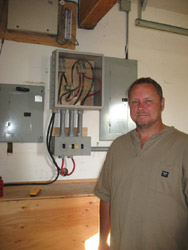
Hope it helps-
Chris
Back To Off Grid Living
|